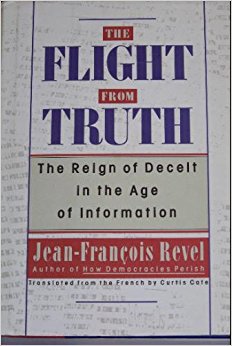While M. Revel’s critique of Western leftists and fellow travelers is fully shared by me, I part company with him when it comes to the issue of the durability of communist systems. Both he and I were among the vast number of observers and critics of such regimes who did not anticipate their spectacular and rapid disintegration. I am more than happy to admit that I was mistaken in attributing to them greater powers of survival than they actually possessed; M. Revel, however, is reluctant to do so. Even in the introduction to the English edition (which seeks to update the original published in France in 1988) some of his observations are dated: “the political system of communism . . . is extraordinarily resistant . . . “; “Moribund but incapable of dying communism seems able neither to cure itself nor to pass away”; “the fundamental principles of Soviet foreign policy under its new guise, remain the same.” In fact, the most interesting question in analyzing these systems is what made them finally so fragile, despite their enormous concentration of political and economic power.
In The Flight From Truth, M. Revel continues the wholly laudable enterprise of exposing and criticizing Western misperceptions of communist systems and the left-liberal attitudes and biases of Western intellectuals (and quasi-intellectuals) with special reference to the media people. In doing so, he repeatedly expresses astonishment at the human tendency to resist information, the inability or unwillingness to draw the proper conclusions from available information, the capacity for self-deception, the displays of hypocrisy, and the stubborn attachment to outworn leftist ideas and ideologies. M. Revel is also a connoisseur of intellectual double standards, for which he provides impressive documentation. (“Two taboos joined forces to create the joint silence . . . the sempiternal fear of being taken for a reactionary in criticizing a so-called ‘progressive’ state and that of seeming to be a racist if one condemns the massacre of Africans by other Africans.”) He also notes the cordial relations between UNESCO and the UN, and genocidal Third World dictators such as Sekou Toure, Mengitsu, Macias, and the rulers of Rwanda and Burundi whose massacres failed to elicit moral indignation among otherwise protest-prone moralizing Westerners.
He attacks with particular relish Western “third worldism,” and what he calls selective antiracism (“the only true racism . . . is white capitalist racism”) and the variety of anti-Western attitudes in the West that survived the collapse and discreditation of communist systems and ideologies. He correctly observes that there is “nothing to suggest that leftists have managed to overcome the prejudice that grants to theoretically ‘progressive’ regimes a social immunity whereby they are simultaneously absolved of responsibility for any absence of democracy, disregard for human rights, and lack of food for their citizens.”
He also demolishes the lingering false meanings and associations of “the Left” (though this had been done before by Edward Shils and others) and he correctly insists that although Western leftwing political parties are in decline, many of their ideas and beliefs survive. In other words, the adversary culture lives and continues to “project onto liberal societies the very defects [it] refuse [d] to discern in totalitarian societies.”
American readers will be greatly interested to learn that parallels exist between the attitudes and behavior of alienated intellectuals in Western Europe and in the United States. If we have “multiculturalism,” in French education a stubborn pro-Soviet and anticapitalist bias persists. If the charge of racism is the ultimate moral delegitimation in this country, frank discussion of the problems of immigration from Third World countries is a corresponding taboo in Western Europe among the “liberal” intelligentsia.
Although the findings of this volume are not exactly new even when one compares the book with M. Revel’s earlier work, they do usefully and importantly document attitudes and beliefs in an era when the collapse of communism may create an impression that these are things of the past. In fact, at the present time when dreamers of socialism confront the unraveling of its historical institutions, their disappointment only reinvigorates their hostility toward capitalism, Western culture, and political democracy. It remains to be seen how greatly their animus will affect the world in the decades to come.
[The Flight From Truth: The Reign of Deceit in the Age of Information, by Jean-François Revel (New York: Random House) 408 pp., $25.00]

Leave a Reply